Business
Ninewells Hospital becomes the labour room to 11 babies from one family
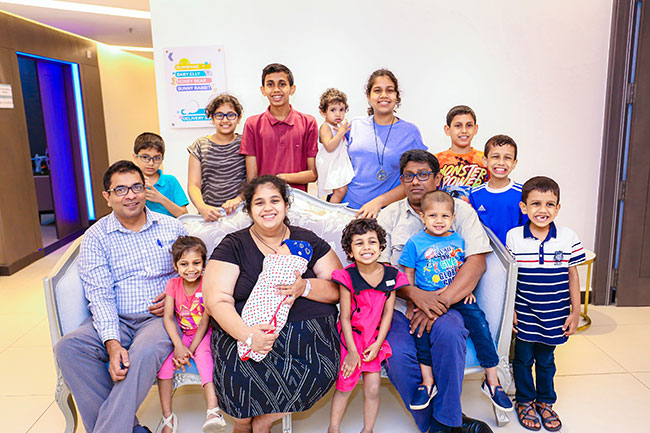
Dr. Nilan Kalidasa Rodrigo (left – seated) with the Ranjithan family.
A symbolic moment that signifies the parent’s trust in the hospital.
Recently, the labour room of the premier hospital dedicated to women and childcare, the Ninewells Hospital witnessed a significant moment in its service history, the 11th baby born into one family.
This historic moment symbolizes the trust in the services of the Ninewells Hospital by the proud parents from Colombo, K. Ranjithan, and his wife, as they experienced the birth of their 12th child. This happy event took place under the watchful supervision of consultant obstetrician and gynecologist, Dr. Nilan Kalidasa Rodrigo as he delivered the couple’s 12th child, a boy, whose 10 older brothers and sisters were also born at Ninewells Hospital.
Mithila Ranjithan, an accountant by profession working in the field of information technology, and his wife have shown unwavering faith in the service of the establishment as they have trusted their family’s wellbeing to the hospital for many years. Mr. Ranjithan made this statement about the birth “we came to Ninewells for the birth of our first child because the hospital has specialist doctors and staff who are renowned for their dedication towards maternal health and childcare. Over the years our trust has grown continuously. The development of each section of the hospital has resulted in the love, trust, and the strengthening of our bond with the hospital.”
The consultant obstetrician and gynecologist, Dr. Nilan Kalidasa Rodrigo, who delivered five of the couple’s children said “whilst congratulating Mr. and Mrs. Ranjithan I want to thank them for their continuous faith in us. Their trust is the highest accolade we can receive, especially when it refers to the excellent service standards of the maternity and childcare section. On a personal note, I have to say that I am very privileged to part of such a significant moment.”
Built to focus on women and childcare since its inception, Ninewells Hospital with its superior medical services and care has earned a reputation for being the best in its field. A part of the Access Group, the hospital benefits from the knowledge of accomplished doctors, and the advances in healthcare and technology thereby making Ninewells Sri Lanka’s leading hospital for women and childcare. The many facilities at Ninewells such as private labour rooms, an in-house blood bank, and the best intensive care unit for infants in the country ensure that a mother-to-be will receive every conceivable comfort.
“Since our inception, Ninewells has dedicated itself to provide the highest quality care for Sri Lankan mothers. Winning the trust of parents-to-be is the true measure of our success. We hope to be an important partner to countless numbers of Sri Lankan parents as we were to Mr. and Mrs. Ranjithan; this is our aim for the future” said Dr. Vibash Wijeratne, Chief Operating Officer & Medical Director of Ninewells Hospital.
Mothers and parents who require counselling can receive these services through support programs on topics such as managing pain during childbirth, and breastfeeding. In addition, Ninewells Hospital offers a 24-7 maternal and childcare emergency care service.
Business
Human-elephant conflict mitigation efforts intensify
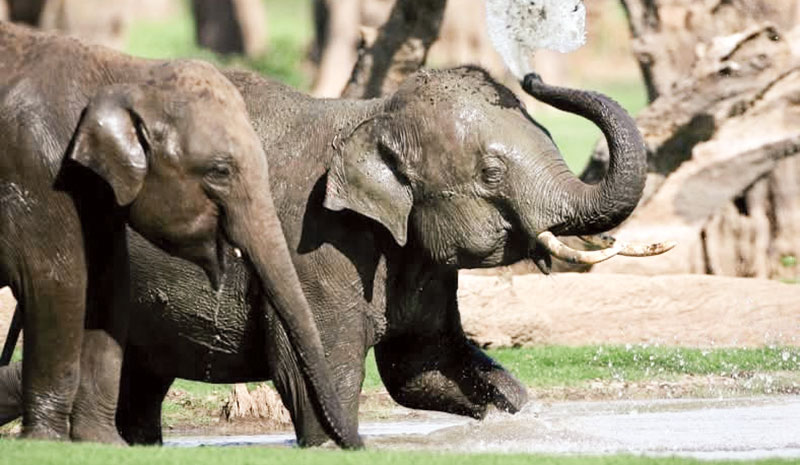
The Sri Lankan government has intensified its efforts to mitigate human-elephant conflicts and reduce elephant fatalities, allocating substantial funds in the 2025 budget for elephant conservation. The Department of Wildlife Conservation (DWC) has introduced a range of targeted measures, emphasizing public participation and localized interventions.
Recognizing the critical role of local communities, the government has launched awareness programs in high-risk Grama Niladhari divisions. By 2025, 23 villages have been identified for intervention, with 43 awareness programs planned. These initiatives aim to educate residents on coexistence strategies and reduce human casualties.
To physically deter elephants from entering villages, authorities are fast-tracking the construction of electric fences and the establishment of watch posts. The Civil Security Force will play a key role in these operations, enhancing protection through continuous monitoring and rapid response mechanisms.
In response to the alarming rise in illegal elephant killings, the government has reaffirmed its commitment to enforcing the Flora and Fauna Protection Ordinance. The Department of Wildlife Conservation has warned that perpetrators who engage in poaching or use firearms and explosive traps will face severe legal consequences, including criminal prosecution and heavy penalties.
Commenting on these developments, Ranjan Marasinghe, Director General of the Department of Wildlife Conservation, stressed the urgency of the situation:
“Sri Lanka’s wild elephant population is an invaluable national asset and balancing conservation with human safety is a top priority. Our latest initiatives integrate community-driven solutions with stronger legal enforcement to ensure the long-term survival of elephants while protecting human lives.”
Manjula Amararatne, Director of Protected Area Management, emphasized the department’s proactive stance:
“By enhancing physical deterrents such as electric fences and engaging local communities in conservation efforts, we are creating sustainable solutions to minimize conflicts.”
Meanwhile, U.L. Taufiq, Deputy Director (Elephant Conservation), stressed the role of law enforcement:
“Illegal elephant killings must stop. We are working closely with the judiciary to ensure those responsible face the full extent of the law.”
by Ifham Nizam
Business
Central Bank vows trickle-down relief to the people
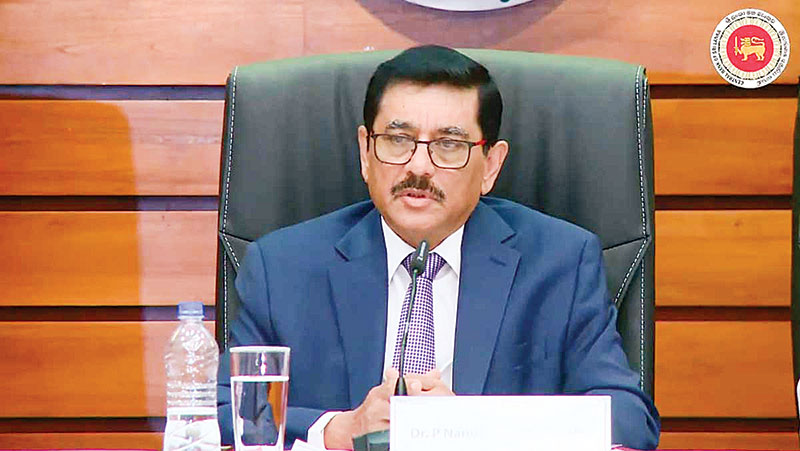
Dr. Nandalal Weerasinghe, Governor of the Central Bank of Sri Lanka, assured on Wednesday that a systemic economic “trickle-down” effect would create new employment opportunities, generate greater economic dividends, and provide better government services to the people, among other benefits.
The Governor’s remarks came in response to a question posed by The Island Financial Review:
The Island: “Governor, Sri Lankan banks have reported robust profits and strong balance sheets, yet ordinary citizens remain trapped in a daily struggle for survival. At a recent business forum, a prominent banker argued that the ‘trickle-down effect’ would eventually alleviate public hardship. Do you agree with this theory, and if so, when will Sri Lankans actually feel relief in their lives?”
Governor: “The banking sector’s return on equity aligns with sustainable business practices. The banking industry, like tourism, manufacturing, or any other sector, must generate reasonable profits to survive and expand. This profitability is not unique to banks; it is a prerequisite for broader economic recovery. During the crisis, many sectors collapsed, but banks could not afford losses, as public trust hinges on their stability. Had banks failed, depositors would have panicked, triggering a bank run. We instructed banks to prioritise stability while accepting modest profits during the worst of the crisis. Their current profits remain disproportionate compared to other sectors. As the economy strengthens, recovery will generate jobs, dividends, and services, enabling the trickle-down effect to reach all citizens.”
The Governor made these remarks during the Q&A session following the second Monetary Policy Review for the period up to March 2025.
When asked whether the Central Bank was intervening to safeguard the rupee, the Governor replied, “We have been purchasing US dollars—we buy dollars from the market.”
On foreign exchange supply and demand, he stated, “It fluctuates daily for various reasons. In February and March 2024, we observed foreign inflows into government securities. Meanwhile, exporters and the remittance sector are performing well. Import demand remains stable at healthy levels. Thus, there is a ‘nice balance’ between foreign exchange inflows and outflow.”
According to the Review, rupee liquidity remains in surplus, and market interest rates continue to decline in line with the eased monetary policy. Credit flows to the private sector remain robust, supported by low interest rates. The Central Bank expects this trend to continue, bolstering domestic economic activity.
The Governor also noted that car import orders received thus far total approximately USD 200 million.
Authorities had initially projected USD 1 billion would be required to meet the car import demand after an import ban that lasted nearly 5 years and that would help accrue significant amount of taxes to the Treasury.
By Sanath Nanayakkare
Business
CEAT Kelani reaffirmed by CPM as one of Sri Lanka’s best-managed companies
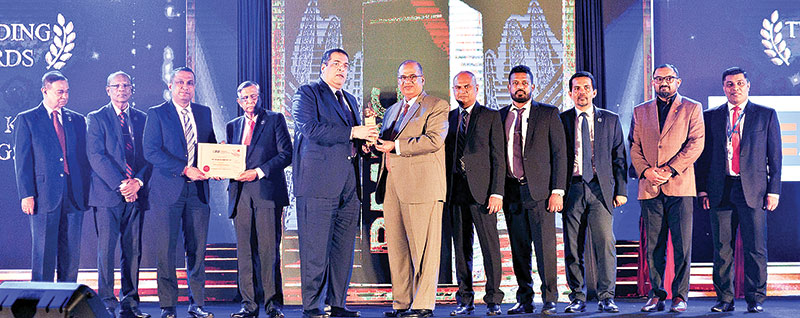
CEAT Kelani Holdings has been adjudged the best-managed tyre manufacturing company in Sri Lanka and reaffirmed as one of the top 20 companies in the country for best management practices, by the Institute of Chartered Professional Managers (CPM) Sri Lanka.
The company received the Category Award in the ‘Tyre, Rubber, Metal & Wood Furniture’ sector at the 2025 edition of CPM’s ‘Best Management Practices Company Awards’ in addition to the Top 20 award presented at the awards gala. This is the second consecutive year that CEAT Kelani was recognised as one of the best managed companies in Sri Lanka.
The CPM awards honour the best practices in management in terms of leadership, policies and strategies, people management, partnerships & resources, processes and performance.
“Awards of this nature will encourage us to strive for even greater heights in management practices, adopting global best practices in aligning strategic direction with a people-centric approach,” CEAT Kelani Managing Director Ravi Dadlani said. “We have already shattered the stereotype for large-scale manufacturing operations and are considered a case study for a successful privatisation of a state-owned enterprise, with unprecedented achievements in productivity, product development, deployment of new technology, research and development, market leadership, sustainability and good corporate citizenship.”
He said CEAT Kelani has transformed from an “inside-out” company to an “outside-in” organisation, placing customer and market centricity at the core of everything it does. This shift is reinforced through regular market visits by employees at all levels, including management, shop floor staff, and all business functions.
-

 News6 days ago
News6 days agoSeniors welcome three percent increase in deposit rates
-

 Features6 days ago
Features6 days agoThe US, Israel, Palestine, and Mahmoud Khalil
-

 News6 days ago
News6 days agoScholarships for children of estate workers now open
-
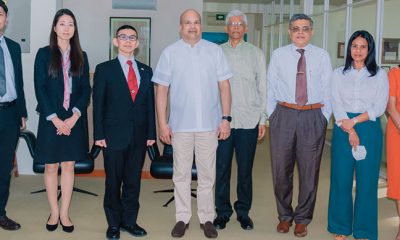
 News7 days ago
News7 days agoDefence Ministry of Japan Delegation visits Pathfinder Foundation
-

 Foreign News4 days ago
Foreign News4 days agoBuddhism’s holiest site erupts in protests over Hindu ‘control’ of shrine
-
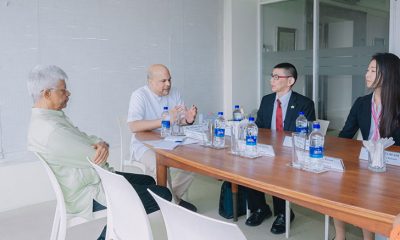
 News6 days ago
News6 days agoJapanese Defence Delegation visits Pathfinder
-

 Editorial7 days ago
Editorial7 days agoWhen promises boomerang
-

 News7 days ago
News7 days agoBan on altar girls upsets nuns, stirs talk on women’s church roles











